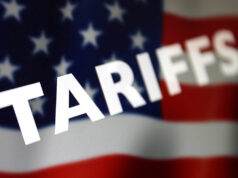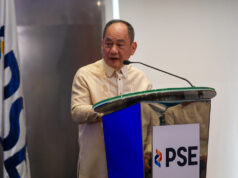Exploration ban must stay until collision solved
By Arjay L. Balinbin, Reporter
IT IS not the right time yet for President Rodrigo R. Duterte to lift the moratorium on exploration and drilling works at the Recto Bank or Service Contract (SC) 72 in the West Philippine Sea, analysts said on Monday, noting that the government should settle first the June 9 collision incident in the area.
“For one, if you lift the moratorium and with this incident, it’s like adding insult to the injury,” Law and Business professor Antonio A. Ligon of De La Salle University (DLSU), who has also been conducting lectures on South China Sea issues, said in a phone interview.
He added that government should continue to enforce the moratorium until the incident involving suspected Chinese militia posing as fishermen who rammed and sank an anchored Filipino fishing boat is “settled appropriately.”
“The President can [lift] that as Chief Executive but it’s not the right time until we are clearly settled on this Recto Bank incident issue,” he said.
“If you are going to lift it, you are giving mixed signals, and that might complicate what’s happening,” he added.
On Sunday last week, Department of Energy (DoE) Undersecretary Felix William B. Fuentebella said in a phone message that the request for the lifting of the moratorium was submitted to the Office of the President last February.
Presidential Spokesperson Salvador S. Panelo told BusinessWorld in an ambush interview that the President has yet to act on the request.
In a phone interview on Monday last week, Jesus T. Tamang, DoE’s director for energy policy and planning bureau, said there have been “bilateral discussions” between China and the Philippines on how to proceed with activities in the disputed areas in the West Philippine Sea.
“There is really that bilateral discussion with the Philippines and China,” he said.
Asked whose voice will likely dominate the decision on the proposed lifting of the moratorium, he said: “Sa atin (Ours). Ang DoE ang sumisilip ng mga (It’s the DoE that reviews) government contracts, so it’s going to be our representatives doon sa (there at the) bilateral consultation.”
He added that the recent Recto Bank incident is still “hot,” so the government is taking it “one step at a time.”
Also sought for comment, Renato C. De Castro, a professor of International Studies at DLSU, said in a phone interview on Monday that the President is unlikely to lift the moratorium at this point.
“I don’t think the President will even consider that. The only way we can have a joint exploitation of resources at the Reed Bank is through [a] joint development [agreement],” he said.
He added, “I don’t think that will happen knowing the policy of the President. He will never dare challenge China. Once you lift it, you are challenging China’s nine-dash line [claim]. I don’t think the President has the courage or the inclination [to do that].”
On entering into a joint development deal with China, Mr. De Castro said: “Of course, the joint development [deal] with China has caveat. Before you enter into a joint development [deal] with China, you have to accept China’s indisputable claim to the South China Sea.”
He said the lifting of the moratorium will only come after both countries enter into that agreement.
“Katulad ‘yan ng nangyari sa (That is the same as what happened in) Scarborough Shoal. China allowed us to fish pero (but) with the caveat, China [saying] that ‘Oh we are giving you the permission to fish.’ So once they give you a permission, it means they own it,” he explained.
Last year, Mr. Duterte described the possible joint exploration with China in the West Philippine Sea as “co-ownership.”
The DoE placed SC 72 under force majeure in 2015 because the contract site falls within the area that was, at that time, the subject of an arbitration process between the Philippines and China.
The Permanent Court of Arbitration in The Hague in the Netherlands ruled in 2016 that the Recto Bank lies within the Philippines’ exclusive economic zone (EEZ) as defined under the United Nations Convention on the Law of the Sea (UNCLOS).
CHINA HAS REFUSED TO RECOGNIZE THIS RULING.
On whether the President’s “soft” approach to the June 9 Recto Bank incident issue would have any impact on his satisfaction ratings, Polytechnic University of the Philippines (PUP) Sociology professor Louie C. Montemar said via chat: “I think it would, only initially, make a dent on his satisfaction ratings. With the economy in a ‘goldilocks’ zone as BSP (Bangko Sentral ng Pilipinas) Chief (Benjamin E.) Diokno puts it, I think the President can slide through all these again.”
SENATE
Meanwhile, Senate President Vicente C. Sotto III on Monday said the sinking of the Philippine fishing boat may have been an accident, but the failure of the Chinese vessel’s crew to help the Filipinos has to be investigated.
Mr. Sotto said determining whether the light of the Philippine fishing boat was on during the incident is crucial.
“Critical in this boat sinking is did the anchored Philippine banca have a white masthead light on. If it did the collision was deliberate. If it didn’t it could be accidental,” Mr. Sotto told reporters over phone message on Monday.
Upon consultation with an expert from the Philippine Coast Guard, however, Mr. Sotto learned it is likely the crewmen of the Chinese vessel did not see the fishing boat until it was near.
“There is no way we can verify whether the mast light was lighted or not. This is a small fishing boat and normally they don’t display it specially in areas where there is no maritime traffic,” Mr. Sotto said.
“The FB (Gem-Ver) was hit slightly on the astern (rear part) and intentional ramming would be thru the side. Also, it was the boom of the Chinese boat that hit the mast of the Filipino FB which could mean that the Chinese only saw the FB when it was near and tried to do a hard left or hard right with its engines on full astern thus the damage is minimal.”
The senator, however, clarified that while this could be the case, the abandonment of the Filipino fishermen is an issue they still have to face.
“The opinion sent to me by a Coast Guard expert does not preclude the fact that the Chinese vessel left and run. That is the issue that should be addressed by those heartless fishermen in the vessel,” he said.
Senate Minority Leader Franklin M. Drilon, for his part, recommended that an independent body be created by the President to probe the incident.
“Instead of a joint panel we should create an independent probe body, similar to what was formed in the past during the time of president Gloria Macapagal-Arroyo, if you recall the Feliciano commission was created to look into the Oakwood incident,” Mr. Drilon told reporters in a chance interview Monday.
“Similarly, such body should be created by the President and give that probe body jurisdiction to make recommendations, inquire into the Recto Bank incident and submit the report to congress, submit the report to the President.”
FISHERMEN
In a related development, the Bureau of Fisheries and Aquatic Resources (BFAR) said the fiberglass boats distributed to the fishermen of FB Gem-Ver is functional but can also be used for fishing within municipal waters.
“That’s an 18 horsepower engine. Ang kailangan lang i-volt mo ng maigi. Umandar na (You just have to volt it properly then it will function properly),” BFAR National Director Eduardo B. Gongona told reporters on the side of an event in Quezon City.
He said that while the fishermen cannot go out yet to their traditional fishing grounds as their boat is being repaired, “they should fish first using that fiberglass boat na pang (for) municipal waters.”
The 12 units of fiberglass fishing boats were given to them under the FB Pagbabago Program of the bureau, which includes engines and gears, and life jackets.
In total, 15,000 units have been distributed to fishermen since the launch of the program in 2016.
“This program is in response to the requests from poor fishermen all over the country for sturdy fishing boats they could use for fishing in the municipal waters,” Agriculture Secretary Emmanuel F. Piñol said in a social media post.
These boats can go up to 15 kilometers from the coast if the water is calm.
Critics of the program say this is not really helpful to fisherfolk.
Mr. Gongona defended that their aim is to provide livelihood assistance.
He added that the bureau has been working on the installation of transponders in fishing vessels to detect them when they are out at sea. By end of the year, BFAR targets to have distributed 5,000 units. — with Charmaine A. Tadalan and Vincent Mariel P. Galang



